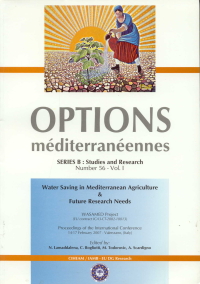| Article précédent | p. 63-71 | Article suivant |
Lemon evapotranspiration and yield under water deficit in Jordan valley
In countries with limited water resources like Jordan, deficit irrigation (DI) could be used as a strategy to manage water more efficiently while maintaining good production without significant yield reduction. This research was conducted in the Jordan Valley to test two DI levels against the standard practice of full irrigation by evaluating yield and actual evapotranspiration. The study was conducted for two consecutive years (2005 and 2006) on full-grown lemon trees (10-year old) using three irrigation treatments : T1 for full irrigation, T2 for 75 percent of T1 and T3 for only 50 percent of T1. The field was irrigated, from the beginning of April to the end of November, twice a week using a microirrigation system with pressure compensating emitters while the irrigation duration varied according to the irrigation depth applied for each treatment. The root zone depletion analysis showed that lemon trees in T3 were under water stress from early June to harvest and from mid of June to end of October for T2 in both years, whereas no water stress occurred in T1 for the two years. The yield in 2005 was 17.8, 28.6 and 13.3 ton/ha whereas the yield in 2006 dropped to 16.3, 17.8 and 12.8 ton/ha for T1, T2 and T3, respectively. Improved water use efficiency was observed for the 75 percent level of DI in the first year and slight differences were obtained in the second year. From these results, one may conclude that the implementation of the 75 percent DI instead of full irrigation would be recommended to save water while sustaining the yield.
- [ Afficher ]
- [ Télécharger ]
- [ Exporter la citation ]
Vous pouvez télécharger la citation au format :
- [ Imprimer ]
-
Mots-clés
CITRON, DOSE D'IRRIGATION, EVAPOTRANSPIRATION, JORDANIE, METHODE D'IRRIGATION, RENDEMENT DES CULTURES, STRESS DU A LA SECHERESSECiter cet article
Shatanawi M., El Bakri J., Suleiman A.A. Lemon evapotranspiration and yield under water deficit in Jordan valley. In : Lamaddalena N. (ed.), Bogliotti C. (ed.), Todorovic M. (ed.), Scardigno A. (ed.). Water saving in Mediterranean agriculture and future research needs [Vol. 1]. Bari : CIHEAM, 2007. p. 63-71. (Options Méditerranéennes : Série B. Etudes et Recherches; n. 56 Vol.I). Proceedings of the International Conference WASAMED Project (EU contract ICA3-CT-2002-10013), 2007/02/14-17, Valenzano (Italy). http://om.ciheam.org/om/pdf/b56_1/00800101.pdf



